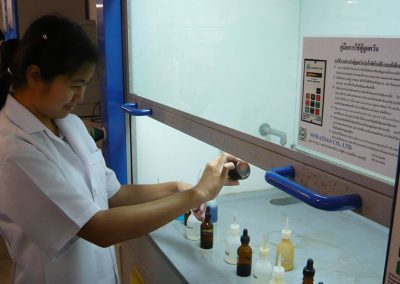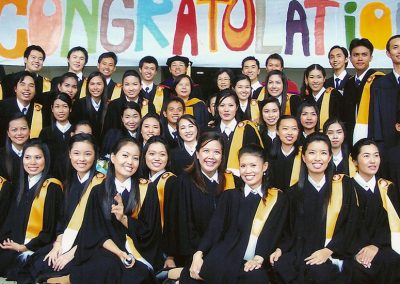เปลี่ยนภาษา: English
เรียนที่ CM-TU
วิทยาศาสตรมหาบัณฑิต สาขาวิชาเคมี
(หลักสูตรนานาชาติ)
ภาษาอังกฤษ ภาคปกติ
ระยะเวลา: 2 ปี
จำนวนรับเข้า: 10 คน
คุณสมบัติผู้สมัครเข้าศึกษา:
คุณสมบัติของผู้เข้าศึกษาต้องเป็นไปตามข้อบังคับมหาวิทยาลัยธรรมศาสตร์ว่าด้วยการศึกษาระดับบัณฑิตศึกษา พ.ศ. 2561ข้อ 22-23 และต้องมีคุณสมบัติดังนี้
- เป็นผู้สำเร็จการศึกษาชั้นปริญญาตรีทางวิทยาศาสตร์ สาขาเคมี หรือสาขาอื่นที่เกี่ยวข้อง ทั้งในหรือต่างประเทศจากสถาบันที่สภามหาวิทยาลัยรับรองวิทยฐานะ โดยต้องมีค่าระดับเฉลี่ยสะสมไม่ต่ำกว่า 2.5 หรือต้องมีประสบการณ์ในการทำงานทางด้านเคมีแล้วไม่น้อยกว่า 2 ปีโดยมี คำรับรองจากผู้บังคับบัญชา หรือหัวหน้าโครงการวิจัย หรือได้รับความเห็นชอบจากคณะกรรมการสอบคัดเลือก
- ผู้เข้าศึกษาต้องส่งผลทดสอบภาษาอังกฤษ TU-GET หรือ TOEFL หรือ IELTS (ผลสอบต้องไม่เกิน 2 ปี นับถึงวันสมัคร)
- ในกรณีที่ผู้สมัครมีคะแนนสอบภาษาอังกฤษไม่เป็นไปตามเกณฑ์ที่กำหนดไว้ใน ข้อ 2 แต่มีผลการเรียนระดับดีมาก หรือมีผลงานวิจัยที่เคยได้รับการตีพิมพ์หรือเผยแพร่ในวารสารวิชาการหรือในงานประชุมวิชาการ คณะอาจรับเข้าศึกษาแบบมีเงื่อนไข โดยต้องมีคะแนนสอบภาษาอังกฤษไม่ต่ำกว่าเกณฑ์ที่กำหนดไว้ และได้รับความเห็นชอบจากคณะกรรมการสอบคัดเลือก
จำนวนหน่วยกิต:
- จำนวนหน่วยกิต รวมไม่น้อยกว่า 36 หน่วยกิต
- วิชาบังคับ 3 หน่วยกิต
- วิชาบังคับเลือก 9 หน่วยกิต
- วิชาเลือก 6 หน่วยกิต
- วิทยานิพนธ์ 18 หน่วยกิต
ค่าเล่าเรียน:
- N/A
สถานที่ศึกษา:
ใช้สถานที่และอุปกรณ์การสอนที่มีอยู่ในภาควิชาเคมี
คณะวิทยาศาสตร์และเทคโนโลยี มหาวิทยาลัยธรรมศาสตร์
ศูนย์รังสิต
ติดต่อหลักสูตร:
![]() 0-2564-4440-79 ต่อ 2409
0-2564-4440-79 ต่อ 2409
![]() https://chemistry.sci.tu.ac.th/
https://chemistry.sci.tu.ac.th/
![]() chemistrythammasat
chemistrythammasat
![]()
ในการพัฒนาประเทศเพื่อให้คนในสังคมมีคุณภาพชีวิตและมีสภาวะความเป็นอยู่ที่ดีขึ้นนั้น นอกจากจะต้องเร่งพัฒนาคนแล้วยังจะต้องทำการส่งเสริมความก้าวหน้าในด้านวิทยาศาสตร์และเทคโนโลยีเพื่อนำทรัพยากรต่างๆ มาใช้อย่างเหมาะสมและมีประสิทธิภาพสูงสุด และไม่ก่อให้เกิดผลกระทบในด้านลบต่อสังคมและสิ่งแวดล้อมทั้งในทางตรงและทางอ้อม ซึ่งหากจะทำให้เกิดผลในทางปฏิบัติอย่างแท้จริงแล้วจำเป็นต้องอาศัยนักวิทยาศาสตร์ที่มีความรู้ความสามารถเป็นจำนวนมาก
วัตถุประสงค์ของหลักสูตร
- เพื่อผลิตมหาบัณฑิตสาขาเคมีที่มีความเป็นเลิศทั้งทางด้านวิชาการและการประยุกต์ใช้ เพื่อสนองความต้องการตามนโยบายการพัฒนาเศรษฐกิจ และสังคมแห่งชาติของประเทศ
- เพื่อผลิตมหาบัณฑิตที่มีความเข้าใจทางเคมีอย่างลึกซึ้ง มีศักยภาพ และมีความสามารถในการถ่ายทอดความรู้แก่ผู้อื่นได้และมีจริยธรรมต่อสังคม
- เพื่อผลิตมหาบัณฑิตสาขาเคมีที่มีความสามารถในการดำเนินการวิจัย เพื่อการพัฒนาทางวิชาการ
การทำวิทยานิพนธ์
- นักศึกษาจะจดทะเบียนทำวิทยานิพนธ์ได้ เมื่อศึกษารายวิชามาแล้วไม่น้อยกว่า 2 ภาคการศึกษา และจะต้องมีหน่วยกิตสะสมไม่น้อยกว่า 12 หน่วยกิต โดยมีค่าระดับเฉลี่ยสะสมไม่ต่ากว่า 3.00
- นักศึกษาต้องทำวิทายานิพนธ์เป็นภาษาอังกฤษ
- หลังจากจดทะเบียนทำวิทยานิพนธ์แล้ว นักศึกษาจะต้องเสนอโครงร่างวิทยานิพนธ์ต่อคณะกรรมการบริหารโครงการจัดการเรียนการสอนหลักสูตรวิทยาศาสตรมหาบัณฑิต สาขาวิชาเคมี เพื่อเสนอคณบดีคณะวิทยาศาสตร์และเทคโนโลยีดำเนินการแต่งตั้งอาจารย์ที่ปรึกษาวิทยานิพนธ์และกรรมการสอบโครงร่างวิทยานิพนธ์ รวมไม่น้อยกว่า 3 ท่าน
- อาจารย์ที่ปรึกษาวิทยานิพนธ์ ให้เป็นไปตามเกณฑ์มาตรฐานหลักสูตรระดับบัณฑิตศึกษาของสำนักคณะกรรมการอุดมศึกษา
กลุ่มอาชีพเป้าหมายเมื่อจบการศึกษา
- อาจารย์ ในมหาวิทยาลัยของรัฐ และเอกชน
- นักวิจัย นักวิทยาศาสตร์ ทดสอบ ตรวจสอบสารเคมีในหน่วยงานราชการ และเอกชน
- นักวางแผนและควบคุมการผลิตในอุตสาหกรรมเคมี
- นักควบคุมและประกันคุณภาพในอุตสาหกรรมเคมี
- นักขายเคมีภัณฑ์ เครื่องมือ และอุปกรณ์วิทยาศาสตร์
“นอกจากความรู้ที่เราได้รับจะทำให้เราประสบความสำเร็จในหน้าที่การงานแล้ว ความอดทนและความรับผิดชอบที่เราได้จากการเรียนที่นี่ก็มีส่วนไม่น้อยที่จะทำให้เราประสบผลสำเร็จเช่นเดียวกัน“


